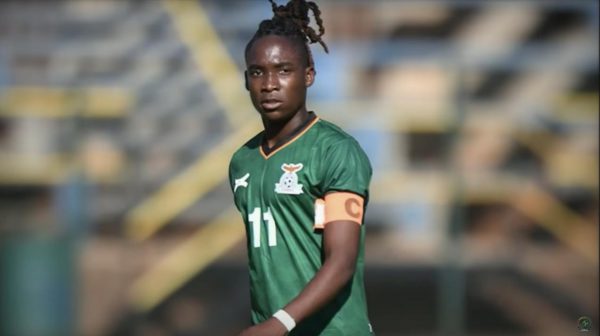International soccer star Barbra Banda of Zambia sat out Wednesday’s Women’s Africa Cup of Nations contest against Tunisia and has been ruled out of competing for the rest of the tournament, because of a test to prove she’s a woman.
Banda’s testosterone levels were found to exceed those allowed by the Confederation of African Football, according to the BBC. Those rules are established by the global governing body, FIFA, and match those of World Athletics, which required South African Olympian Caster Semenya to medically lower her naturally high testosterone levels in order to compete against other female athletes.
The 22-year-old striker and team captain traveled with her teammates to the tournament in Morocco, and is training alongside them, despite not being able to play. Banda also plays for Chinese club Shanghai and is reported to be contemplating an offer to join Spain’s team.
ESPN reports the head of the Zambian Football Association is pressing the CAF for a review.
“Our FA President is in Morocco and has been pursuing this matter with his colleagues in CAF,” FAZ communications director Sydney Mungala told ESPN about the efforts by ZFA president Andrew Kamanga. “The Barbra case is just one example, but the broader picture is to strive to see how these regulations can be more responsible for the general situation — not just Zambia. Many players can be affected by these regulations, and football is their livelihood. I think the CAF regulations are a lot more stringent [than Olympic regulations], and they put too much stress on testosterone levels.”

Despite being barred from competing in this tournament, Banda was cleared to play in last year’s Olympic Games. Banda scored back-to-back hat-tricks in Zambia’s debut in the Tokyo Summer Games last year, the first woman to have done so, and to net six goals across two matches in the history of the women’s competition.
But because of her T-levels, Banda was not permitted to play in Sunday’s match with Cameroon, which ended in a 0-0 draw, nor Wednesday’s 1-0 victory over Tunisia. Striker Siomala Mapepa wore her number 11 uniform for the Copper Queens.
At a news conference Sunday, the BBC asked CAF’s communications director Lux September how it was possible for Banda to have played in the Olympics but not in the Women’s Africa Cup of Nations. September denied his organization barred Banda, claiming “There is no such decision from the CAF medical committee.”
Kamanga responded with irritation, according to the BBC, saying “whatever happened was purely a CAF requirement.” The team president called it “unfair” to pin the decision to bench Banda on his team, and labeled the gender verification regulation “discriminatory.”

“If you take it to the next level in the FIFA competitions,” said Kamanga, “you now start questioning why it should only be enforced in this competition, when it should really cut across all competitions.”
FIFA’s regulations, which date back to 2011, say “Androgenic hormones have performance-enhancing effects which may provide an advantage in football.”
What’s unclear is what Banda did or didn’t do in order to comply with the rules. The BBC reported she took “medication to help reduce her levels of testosterone” but the team spokesperson, Mungala, told ESPN that Banda and other players declined a course of hormone suppression treatment.
“I think there are possible side effects,” he said.
Semenya knows all about those. The two-time 800-meter Olympic gold medalist is currently awaiting a verdict in her case from the European Court of Human Rights after previously losing appeals at the Court of Arbitration for Sport and Switzerland’s Federal Supreme Court.
“It made me sick, made me gain weight, panic attacks, I don’t know if I was ever going to have a heart attack,” Semenya recently told HBO Real Sports about trying hormone suppressant medication earlier in her career. “It’s like stabbing yourself with a knife every day. But I had no choice. I’m 18, I want to run, I want to make it to Olympics, that’s the only option for me.”
Caster Semenya on @RealSportsHBO this week. On when she took testosterone-suppressing medication for eligibility: “I didn’t know if I was having a heart attack. It’s like stabbing yourself with a knife every day, but I had no choice.” pic.twitter.com/QzGMieyCqD
— Nick Zaccardi (@nzaccardi) May 23, 2022
Semenya has since decided to not take testosterone suppressing drugs and attempt to compete in other track and field events that don’t require she take medication. When World Athletics officials questioned her sex, she was blunt:
“They thought I had a dick, probably,” she said on the HBO program. “I told them: ‘It’s fine. I’m a female, I don’t care. If you want to see I’m a woman, I will show you my vagina. All right?’”
[embedded content]








